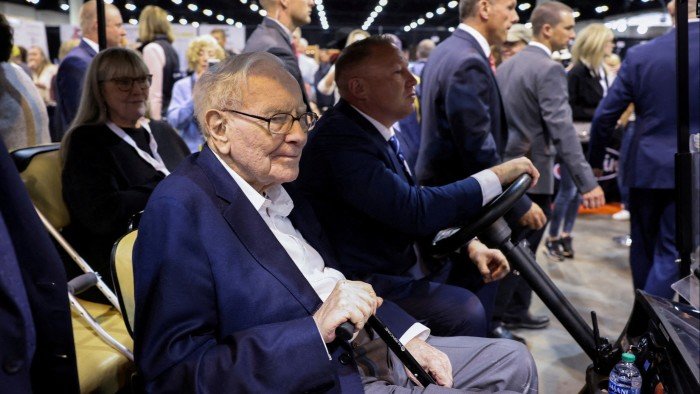Top shale boss says US oil companies will not flock back to Russia

Unlock the White House Watch newsletter for free
Your guide to what the 2024 US election means for Washington and the world
US oil producers are not going to rush back into Russia following any peace agreement between Moscow and Kyiv because they have been badly burnt in the past, according to US shale magnate Harold Hamm.
The Continental Resources’ founder and prominent donor to Donald Trump’s election campaign told the Financial Times that Russia had been a tough place to work for decades and he was thankful he had not followed others who ploughed money into the world’s third-largest oil producing nation.
“A lot of people lost a whole lot of money over there. I think they’re going to be very reticent to want to go back. Once in a while, peace breaks out over there, but not very often,” said Hamm in an interview.
The start of talks between US and Russian officials this week fuelled speculation that American companies could return to Russia, if a peace deal can be agreed and sanctions are relaxed on Moscow. Russian officials specifically flagged the potential for joint investments in hydrocarbons by US and Russian companies, including in the Arctic.
“We know there are US oil companies which would like to return to Russia,” said Kirill Dmitriev, head of Russia’s sovereign wealth fund, who attended the talks with US officials in Riyadh.
ExxonMobil and Chevron, the two largest American oil companies, declined to comment.
Exxon has a long history of investing in Russia but has pulled back following the imposition of western sanctions following Moscow’s invasion of Crimea in 2014 and its full-scale invasion of Ukraine in 2022.
The company pulled the plug on a joint venture with oil company Rosneft to explore Arctic waters in 2018. Four years later Exxon took a $3.4bn impairment charge when it wrote down the value of its stake in the Sakhalin-1 oil project in Russia’s far north-east.
Other western companies got hit harder. BP reported a nearly $25bn writedown linked to its shareholding in Rosneft and other businesses while Shell made a $5bn writedown on its Russian assets in 2022.
Most analysts agree with Hamm that US oil majors will think long and hard before investing following any peace deal due to the geopolitical risks, and opportunities elsewhere.
“Political risks remain sky-high — sanctions relief could be reversed with a US administration change. Companies won’t rush back into a market where rules shift overnight,” said Tatiana Mitrova, a research fellow at the Center on Global Energy Policy at Columbia University.
Hamm, who co-ordinated fundraising among oil and gas interests during Trump’s election campaign worth at least $75mn, said the president had a big decision to make on whether to lift sanctions.
“They can be very effective. Particularly with secondary sanctions, which apply to anyone who transports or handles or trades,” he said.
Hamm said US liquefied natural gas exports would continue to play a critical role in ensuring Europe’s energy security. Europe could depend on the US, despite tensions over Ukraine, he said, adding that the continent’s leaders would be “silly” if they went back to relying on Russian piped gas.
“Europe, those countries are allies, and we’ve always stood up for them. I think they generally stood up for America. I think they should trust President Trump to look out after their best interests as well . . . We’re a country with a rule of law,” said Hamm.
He rejected allegations made by Democrats and other critics that Trump was ignoring the rule of law through some of his actions, which include curtailing birthright citizenship and giving Elon Musk access to government departments to slash spending and jobs.
“Obviously, [Musk] is doing a tremendous service. You know we have had runaway government for the last four years,” he said.
Hamm said Trump was the “most consequential president in modern history” by accomplishing so much in his first 30 days, including exiting the Paris climate accord and slashing environmental rules restricting industry.
Despite concerns within the oil industry that Trump’s threat to impose steep tariffs on Canada and Mexico would raise costs and increase petrol prices, he said they were necessary to tackle other problems.
“The border was number one consideration. Immigration and we had to stop the flow of drugs into this country,” said Hamm. “With Mexico and Canada, the tariffs are probably not going to be big factors if they will co-operate in the future.”
Asked if he thought Trump might try to seek a third term in office, even though this ran contrary to the US constitution, he said he could not contemplate such a thing.
“Thank God we have someone standing up there beside the president — JD Vance. I think he is looking forward to the next term.”
https://www.ft.com/__origami/service/image/v2/images/raw/https%3A%2F%2Fd1e00ek4ebabms.cloudfront.net%2Fproduction%2F8872e9ac-42d2-486b-9c82-577e260b58eb.jpg?source=next-article&fit=scale-down&quality=highest&width=700&dpr=1
2025-02-22 13:00:51






